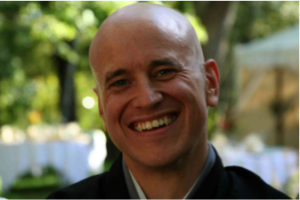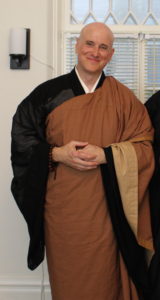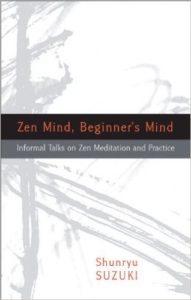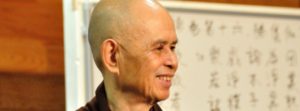Conversation with Soto Zen Buddhist Priest Bussho Lahn on Mindfulness and Creativity
By Stephen Dupont, APR, vice president, Pocket Hercules
Bussho Lahn is an ordained Soto Zen Buddhist priest and a certified spiritual director. He is a teacher at both the Minnesota Zen Meditation Center and the Episcopal House of Prayer, a contemplative Christian community in Minneapolis and Collegeville, Minn.
From the moment I met Bussho Lahn a number of years ago, when we both served on the board of directors for the Episcopal House of Prayer, I’ve been intrigued with the mixing of Christianity and Zen Buddhism. As someone raised Roman Catholic, who eventually made his way to the Episcopal Church, the fact that a Christian-based nonprofit had invited a Buddhist priest to serve on its board absolutely amazed me. But of course, I shouldn’t have been surprised. The very foundation of the Episcopal House of Prayer, which is located on the grounds of Saint John’s University in Collegeville, Minn., is an incredible inter-faith story in of itself.
As I’ve explored mindfulness as part of my own faith life, inspired in part by the writings of Thich Nhat Hanh and Thomas Merton, I decided to reach out to Bussho Lahn to learn about his story, and his thoughts about mindfulness and creativity.
Stephen Dupont: Were you raised as a Buddhist?
Bussho Lahn: No, actually. I was raised Roman Catholic. I grew up in the Minneapolis suburb of Bloomington, Minn., where I attended Saint Edwards Catholic Church. Like a lot of young people, I went to church as a child with my parents, and after I was confirmed as a teen, I stopped attending.
Stephen Dupont: How were you introduced to Buddhism?
Bussho Lahn: I was in my early twenties. It was around 1991 or ’92, and my sister Molly gave me a book to read about Zen Buddhism by Roshi Philip Kapleau called, The Three Pillars Of Zen. It stirred something in me. Eventually, around 1993, I made that big leap and drove to the Minnesota Zen Meditation Center in Minneapolis. I bought a block meditation cushion and sat in on the classes they offered. I did this for six months.

Stephen Dupont: And today, you are a Buddhist priest. How did you go from being a day-to-day practitioner to embracing the life of a Buddhist priest?
Bussho Lahn: Well, day-to-day practice is the life of a priest, so there’s not as much of a gap as you’d imagine. The line between lay practice and ordained monk/priest practice can get very thin in Zen, which is as it should be. “Priest” and “monk” are both imperfect words for what ordination in Zen is. They both work, and they both don’t. Certainly when we’re in a monastery or convent, words like “nun” and “monk” are appropriate. And “priest” seems to fit when we’re performing rituals, ceremonies and liturgy. But we aren’t intermediaries between anyone and anything like the word priest sometimes seem to imply. Nor do we have any mojo to remove sin or prescribe penance, or anything like that. Ordination in Zen, at least right now in America, is mostly an expression of aspiration, and a commitment to make Zen and its precept of non-harm central in your life at all times. It’s a vow of service to the world, and to be life-centered instead of just self-centered.
So the biggest adjustment is really the time spent on meditation, practice, study, and service. After ordination, Zen can’t be just a cool hobby that orbits your life. It has to move to dead center and stay there forever. Then we can be in deep relation with it until we become it. The liberative possibility of this commitment to spiritual practice is enormous, and we see it in all faith traditions. When your spiritual life, or religious life, is central, everything else just falls into place and works. And when it doesn’t, you go right back to the center and ask, “What’s going on in my practice life that might be creating waves or obstacles?”
It’s actually a very simple, practical way of living one’s life, and the joy and peace that arises from that is helpful to all beings.
Stephen Dupont: What do you do at Aslan Institute?
Bussho Lahn: The Aslan Institute is an integrative mental health and wellness clinic located in Eagan, Minn. I work with those who want to intentionally deepen their contemplative spiritual life. I see this connection between our deeply held spiritual beliefs and the workings of our day-to-day mind and heart. I also help those find a connection between spirituality and psychology, which is offered by the other professionals who work at Aslan. I encourage and support their continued spiritual lives, regardless of their faith tradition. In a growing number of cases, I work with what you would call the Nones – individuals who are seeking to build an interior spiritual life without a connection to a formal religious tradition.
Stephen Dupont: For those that want to tip toe into this, do you offer other opportunities such as seminars or workshops?
Bussho Lahn: Yes, I teach meditation, mindfulness, and the basics of Zen Buddhist practice and philosophy. I lead bimonthly Aslan meditation retreats. I also offer retreats through the Episcopal House of Prayer. As a priest, I perform standard and customized wedding ceremonies, rituals, and blessings that can facilitate healing for individuals and groups.
Stephen Dupont: You are married. Is your wife Karen also a practicing Buddhist?
Bussho Lahn: Karen and I have been married for almost ten years. She’s been aware of this journey that I’ve been on from the beginning. Karen also attended Saint Edwards Catholic Church in Bloomington growing up. We met while we were both working in downtown Minneapolis. She would still consider her self a Roman Catholic, although we attended Saint John the Baptist Episcopal Church in southwest Minneapolis for a period in the early 2000’s, which is how I was introduced to the Episcopal House of Prayer.
Stephen Dupont: Do you feel that you are living a life of purpose?
Bussho Lahn: Yes. But I have to say, I found it by grace. I say that with complete humility. This has all fallen into my lap. I think when you feel your heart open to something or someone, trust that. Listen to the song that makes your heart sing. That’s when you know that you’re living a life of purpose. That’s how I feel doing what I do, and what I am.

Stephen Dupont: Many people say that they want to live a life of purpose. How did you know that you were? What were the signs? The feelings that you experienced?
Bussho Lahn: It’s a sense of feeling centered. You show up, for whatever you need to do, such as work, you do the next loving thing. I feel like a living offering.
Stephen Dupont: Did you have any mentors who helped you discover your purpose?
Bussho Lahn: Yes, I certainly do! The entirely of the Zen tradition is passed on teacher to student, so that relationship is central and all-important. Since there’s no Zen School to go to learn this stuff, we need to choose our teacher carefully. When we truly become a student, the whole universe arises as a teacher. I’ve been supported by everything, my whole life, just as each of us are. But more specifically, my Zen teacher is Tim Zentetsu Burkett, abbot of Minnesota Zen Center. I was initiated, ordained, and given dharma transmission (authorization to teach) by him over the course of about ten years. I also consider my spiritual director Lyndall Johnson, the founder of Aslan Institute, to be a formal teacher of mine in this life. I am honored to be the student of each person.
Stephen Dupont: Are their other Zen masters that have influenced your approach to Zen Buddhism?
Bussho Lahn: Yes, I find the works of Hongzhi, Rumi, Suzuki Roshi, and Katagiri Roshi very intriguing. The teaching of practice/enlightenment espoused by Dogen Zenji has also strongly influenced my path toward becoming a Buddhist priest.
Stephen Dupont: Were there any books, movies, or other media that influenced your faith and career journey that you would recommend to others who want to learn more about Zen Buddhism?
Bussho Lahn: So many good books to choose from! You Have To Say Something by Dainin Katagiri Roshi is my favorite book on Zen, and The Heart of the Buddha’s Teaching by Thich Nhat Hanh is my favorite book on Buddhism. But there are so many others, including Zen Mind, Beginner’s Mind by Shunryu Suzuki (a classic), Appreciate Your Life by Taizan Maezumi, and Living by Vow by Shohaku Okumura.
 For websites, I’d recommend www.mnzencenter.org and perhaps the “official” Soto Zen homepage.
For websites, I’d recommend www.mnzencenter.org and perhaps the “official” Soto Zen homepage.
Stephen Dupont: What is one takeaway from being mentored that you can share with others who are seeking a mentor?
Bussho Lahn: In Zen, there’s a saying called, “Grandmotherly Mind.” What it means is that your grand mother loves you unconditionally, but because she is not your parent, she often overlooks a lot. However, that doesn’t mean that she doesn’t have big expectations for you. And, when you cross that line, she will bare her teeth to share her disappointment. It’s because she loves you so much that she doesn’t want you to settle for anything less than what you are.
Stephen Dupont: Many people have embraced this concept of the personal brand. Are there any lessons from Zen Buddhism that someone can apply to themselves as they forge a personal brand?
Bussho Lahn: As you think about your life, and about your career, I think we need to consider that it’s okay to be who you are. Here’s a thought: Write a eulogy about your life. Think of the best possible version of yourself. Go live that life.
Stephen Dupont: As you know, there is a growing group of people in the Western World that do not want to be associated with traditional religion. This group has sometimes been referred to as the Nones. Does Zen Buddhism – or at the very least – meditation, offer a path for Nones who do feel a sense of spirituality, but don’t want the traditional religious trappings?
Bussho Lahn: The gateway is a term called Mindfulness. The Mindfulness Movement grew out of Zen Buddhism, but now has a secular perception to it. We see people coming to the Aslan Institute who want to know more about mindfulness, and as they experience it, they start to realize that want more. They want something bigger. They start to experience transformation. They realize that there is a spiritual side to them and that they’re hungry for more. Some decide to continue further with Buddhism, but others return to traditional religion as well. For example, the Catholic Church has its baggage, but it also has more than 1,000 years of beautiful teachings and practices, too.
Stephen Dupont: Several years ago, Thich Nhat Hanh, wrote a book about how to overcome Fear. So many people are living in a state of fear – fear of being laid off, fear of being left behind by technology, fear for the direction of our country. How would you recommend that people think about fear and overcome their fears?
Bussho Lahn: I would urge everyone to practice meditation. It is the antidote to fear. It literally rewires your brain. We are born as pure light. We are born to say “yes” to life. Meditation helps us return the meaningfulness of our lives back to ourselves.
Stephen Dupont: Can you explain how someone can use Soto Zen Buddhism to enrich a day-to-day practice, such as cooking or eating a meal? Or driving to and from work? Or hobbies, such as cycling or downhill skiing?
Bussho Lahn: “Enrich” is a good word to use, I think. Zen’s instruction around this sort of thing — everyday activity — is repeated very often and is quite clear: when you’re cooking, just cook. When you’re eating, just eat. If you wander, come home. This activity, such as cooking, is where your actual life is. Don’t miss it by deciding that it’s unworthy of full attention and daydream while you chop carrots, or plan your week while you peel potatoes. Simplify. Come back to this moment, just as it is. Chop. Peel. Your whole life is here, so there’s no reason to wander off.
Stephen Dupont: As a person contemplates their purpose and their direction, why is it important that they do the “inner work” to better understand who they are and what they stand for?
Bussho Lahn: Meaning comes from within. It can’t be given or taken from outside. It’s like falling in love — you can’t force it, it just happens. In order to live a life of meaning and purpose, you have to know what your meaning and purpose is, right? So spending a lot of time watching the inner movement of heart and mind is essential to get to know who you really are. It all flows from there.
Stephen Dupont: How can a person bring contemplative prayer into their day-to-day lives? What will they find in embracing a life of contemplative prayer?
Bussho Lahn: No one likes this answer, but it’s true: You bring contemplative practice into your life by bringing contemplative practice into your life. You just do it. Beyond your preferences, evaluations, and judgments, you do it. People who feel a deep longing for this kind of work don’t struggle to include it into their lives; they just do it. So do it! Set your alarm 30 minutes earlier and get up and sit. Do it everyday. No one asks how to bring toothbrushing into their lives, they just do it. No one asks how to bring eating into their lives, they just do it. It has to become like that- automatic, an integral part of who you are. And what you will find is easy to answer: you will find yourself. Then, if you’re really patient and very lucky, you’ll find something beyond yourself. Either way, you can’t miss.
Stephen Dupont: What inspires you? How do you find creativity in what you do? And how can our readers use Zen Buddhism to inspire their creativity?
Bussho Lahn: Life inspires me. Death inspires me. Courage and deep feeling inspire me. Love and heartbreak inspire me. My wife especially inspires me, as do my teachers and my students. Inspiration inspires me. And creativity shows up everywhere. We are an integral part of a creative, creating universe. We literally cannot NOT create. And contemplative practices such as Zen help us to see this fundamental creativity because they help us release the patterning of consciousness — that is, the boxes and labels we put things in. It helps us see the bright, boundless field that is always here, before our ideas and divisions, and that that field is infinitely creative, and it’s infinitely us.
Stephen Dupont: In the prayer of Saint Francis, there is this line: “Make me an Instrument of Your Peace.” How do you think people should approach this concept? Should we think of the work we do, our thoughts, and actions, as moments of transformation?
Bussho Lahn: Ahh, a beautiful prayer…one of the best ever. I approach it as an invitation to surrender to love. To consciously relinquish our usual death-grip on self-will, on ego, and realize that something infinite is yearning to be born through us, and to let that happen. Zen meditation could be described as a moment-to-moment relinquishment of self to make room for the Great Other. And we eventually discover that Great Other to be Great, but not quite so Other as we thought. So every moment is a moment of transformation. It cannot NOT be. Try not to transform and change — it’s impossible. Every moment is a new chance. Every moment is precious beyond imagining. So relax, and pay attention.
Stephen Dupont: You have been involved in interfaith dialogue. For example, you’ve been affiliated with the Episcopal House of Prayer for many years. How can Zen Buddhism enrich my life as an Episcopalian, a Roman Catholic, or a Southern Baptist?
Bussho Lahn: We have lots of Christian folks who practice at Zen Center, and lots of folks of other traditions (or none at all), too. Since Zen is an orthopraxy (practice and experience-based faith), there’s no dogma, at least on the Zen side, to keep anyone out. The goal of Zen is to take us beyond Zen. So even we Zen Buddhists have to hold our tradition carefully, but lightly. It’s not some absolute truth and we certainly don’t have a monopoly on wisdom or compassion. To that end, Zen can be of help to anyone, regardless of religious affiliation. I don’t think Zen is for everyone. It’s just one thing. But it can enrich the lives of people who wouldn’t self-describe as Buddhist.
Stephen Dupont: For those who want to learn more about Zen Buddhism, where should they start?

Bussho Lahn: Come visit us at Minnesota Zen Meditation Center! It’s a friendly and easy place to be, and we get lots of visitors. Or, read You Have To Say Something by Dainin Katagiri Roshi or The Heart of the Buddha’s teaching by Thich Nhat Hanh. Or watch Kung Fu Panda — there’s a lot of good Zen in that movie. That’s my favorite. “There is no secret ingredient!”
Stephen Dupont: Kung Fu Panda?! No way! Okay, so last question: Knowing what you know now, what would you tell your 15-year-old self?
Bussho Lahn: I would tell him that it’s going to be okay. Hang in there sport.
Stephen Dupont: Thank you so much for sharing yourself with us.
Bussho Lahn: You’re welcome.
If you enjoyed this article, there are many more like it at stephendupont.co.
Stephen Dupont, APR, is vice president of public relations and branded content for Pocket Hercules (www.pockethercules.com), a brand marketing firm based in Minneapolis. Contact Stephen Dupont at www.linkedin.com/in/stephendupont or visit stephendupont.co.